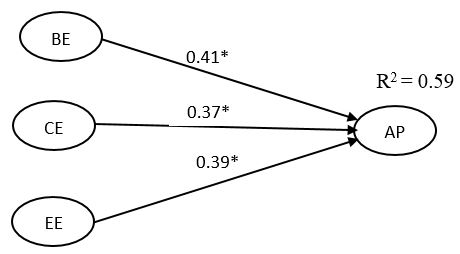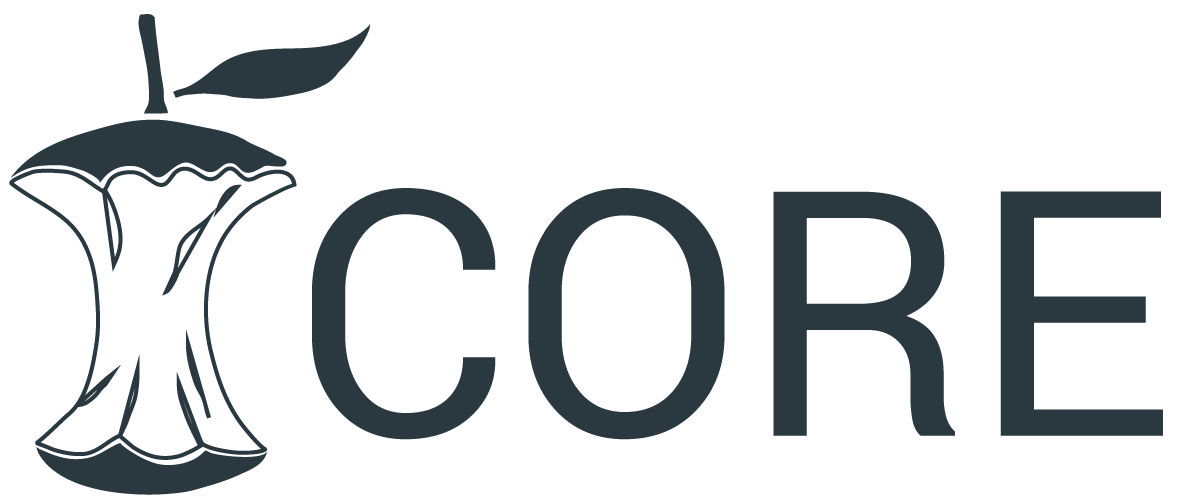Towards an Effective Education System: Harnessing Factors to Enhance Students’ Performance
DOI:
https://doi.org/10.5281/zenodo.15300685Keywords:
academic engagement, cognitive engagement, academic performance, indiaAbstract
The objective of this study was to assess the impact of student engagement on academic performance. Student engagement refers to their participation in scholarly activities and adherence to the university’s goals. The study involved 578 students from different higher educational institutes and universities in central India. The results indicate that cognitive engagement, emotional engagement, and behavioral engagement have a significant impact on academic performance. The research findings would assist academic administrators, professors, and governments improve student performance.
Downloads
References
Aesaert, K., Voogt, J., Kuiper, E., & van Braak, J. (2017). Accuracy and bias of ICT self-efficacy: An empirical study into students’ over-and underestimation of their ICT competences. Computers in Human Behavior, 75, 92–102.
Alolah, T., Stewart, R. A., Panuwatwanich, K., & Mohamed, S. (2014). Determining the causal relationships among balanced scorecard perspectives on school safety performance: Case of Saudi Arabia. Accident Analysis & Prevention, 68, 57–74.
Anderson, J. (2016). Student engagement and the learning incentive program: Evidence and applications. Sensoria: A Journal of Mind Brain and Culture, 12(1), 28–37.
Archambault, I., Janosz, M., Olivier, E., & Dupéré, V. (2022). Student engagement and school dropout: Theories, evidence, and future directions. in Handbook of Research on Student Engagement, pp. 331–355. Springer.
Boekaerts, M. (2016). Engagement as an inherent aspect of the learning process. Learning and Instruction, 43, 76–83.
Chan-Olmsted, S., & Wolter, L.-C. (2018). Emotional engagement in a new marketing communication environment. The Handbook of Communication Engagement, 421–437.
Chi, M. T. H., & Wylie, R. (2014). The ICAP Framework: Linking Cognitive Engagement to Active Learning Outcomes. Educational Psychologist, 49(4), 219–243. https://doi.org/10.1080/00461520.2014.965823.
Clark, K. N., & Malecki, C. K. (2019). Academic grit scale: Psychometric properties and associations with achievement and life satisfaction. Journal of School Psychology, 72, 49–66.
Finn, J. D., & Zimmer, K. S. (2012). Student engagement: What is it? Why does it matter? in Handbook of Research on Student Engagement, pp. 97–131. Springer.
Fornell, C., & Larcker, D. F. (1981). Evaluating structural equation models with unobservable variables and measurement error. Journal of Marketing Research, 18(1), 39–50.
Fredricks, J. A., Blumenfeld, P. C., & Paris, A. H. (2004). School engagement: Potential of the concept, state of the evidence. Review of Educational Research, 74(1), 59–109.
Fredricks, J. A., Filsecker, M., & Lawson, M. A. (2016). Student engagement, context, and adjustment: Addressing definitional, measurement, and methodological issues. in Learning and Instruction, 43, pp. 1–4. Elsevier.
Fredricks, J. A., Ye, F., Wang, M.-T., & Brauer, S. (2019). Profiles of school disengagement: Not all disengaged students are alike. in Handbook of Student Engagement Interventions, pp. 31–43. Elsevier.
Furlong, M. J., & Christenson, S. L. (2008). Engaging students at school and with learning: A relevant construct for all students. Psychology in the Schools, 45(5), 365–368.
Griffiths, A.-J., Sharkey, J. D., & Furlong, M. J. (2009). Student engagement and positive school adaptation. in Handbook of Positive Psychology in Schools, pp. 197–212. Routledge.
Gutman, L. M., & Schoon, I. (2013). The impact of non-cognitive skills on outcomes for young people. A literature review.
Hair, J. F., Risher, J. J., Sarstedt, M., & Ringle, C. M. (2019). When to use and how to report the results of PLS-SEM. European Business Review, 31(1), 2–24.
Hilton, M. L., & Pellegrino, J. W. (2012). Education for life and work: Developing transferable knowledge and skills in the 21st century. National Academies Press.
Holmes, N. (2018). Engaging with assessment: Increasing student engagement through continuous assessment. Active Learning in Higher Education, 19(1), 23–34.
Huei, Y. C. (2014). Student engagement and learning using an integrated student-lecturer engagement design framework. IEEE International Conference on Teaching, Assessment and Learning for Engineering (TALE), pp. 79–85.
Kaiser, J., Retelsdorf, J., Südkamp, A., & Möller, J. (2013). Achievement and engagement: How student characteristics influence teacher judgments. Learning and Instruction, 28, 73–84.
Nelson, S., & Baltes, B. (2019). For the culture: Grit, student engagement, and academic performance at a historically black community college. Journal of Applied Research in the Community College, 26(1), 89–102.
Okolie, U. C., Ochinanwata, C., Ochinanwata, N., Igwe, P. A., & Okorie, G. O. (2021). Perceived supervisor support and learner’s career curiosity: The mediating effect of sense of belonging, engagement and self-efficacy. Higher Education, Skills and Work-Based Learning, 11(5), 966–982.
Palardy, G. J., & Rumberger, R. W. (2019). The effects of 21st century skills on behavioral disengagement in Sacramento high schools. Resisting Education: A Cross-National Study on Systems and School Effects, 53–80.
Rajabalee, B. Y., Santally, M. I., & Rennie, F. (2020). A study of the relationship between students’ engagement and their academic performances in an eLearning environment. E-Learning and Digital Media, 17(1), 1–20.
Reeve, J., & Tseng, C.-M. (2011). Agency as a fourth aspect of students’ engagement during learning activities. Contemporary Educational Psychology, 36(4), 257–267.
Renninger, K. A., & Hidi, S. E. (2020). To level the playing field, develop interest. Policy Insights from the Behavioral and Brain Sciences, 7(1), 10–18.
Santally, M., & Senteni, A. (2004). A cognitive approach to evaluating web-based distance learning environments. Instructional Technology and Distance Learning, 2(1), 45–53.
Schreuder, H. T., Gregoire, T. G., & Weyer, J. P. (2001). For what applications can probability and non-probability sampling be used? Environmental Monitoring and Assessment, 66, 281–291.
Siddiq, F., Gochyyev, P., & Valls, O. (2020a). The role of engagement and academic behavioral skills on young students’ academic performance—A validation across four countries. Studies in Educational Evaluation, 66, 100880.
Siddiq, F., Gochyyev, P., & Valls, O. (2020b). The role of engagement and academic behavioral skills on young students’ academic performance—A validation across four countries. Studies in Educational Evaluation, 66, 100880.
Taylor, S. S., & Statler, M. (2014). Material matters: Increasing emotional engagement in learning. Journal of Management Education, 38(4), 586–607. https://doi.org/10.1177/1052562913489976.
Tynan, M. C., Credé, M., & Harms, P. D. (2020). Are individual characteristics and behaviors necessary-but-not-sufficient conditions for academic success?: A demonstration of Dul’s (2016) necessary condition analysis. Learning and Individual Differences, 77, 101815.
Usán Supervía, P., & Salavera Bordás, C. (2019). Academic performance, emotional intelligence and academic engagement in adolescents. Electronic Journal of Research in Educational Psychology, 17(47). https://search.ebscohost.com/login.aspx?direct=true&profile=ehost&scope=site&authtype=crawler&jrnl=16962095&AN=150118033&h=7uU5Ga5ulaUWF%2BYZNx5vRF9gRCCvlvmczfBainS5rT%2BZdAPrSr63vIfTDP3KgK7S4QoZE3rxluR8ENhCBn%2FwbA%3D%3D&crl=c.
Wang, M.-T., & Eccles, J. S. (2012). Adolescent behavioral, emotional, and cognitive engagement trajectories in school and their differential relations to educational success. Journal of Research on Adolescence, 22(1), 31–39.
Zahedi, L., Batten, J., Ross, M., Potvin, G., Damas, S., Clarke, P., & Davis, D. (2021). Gamification in education: A mixed-methods study of gender on computer science students’ academic performance and identity development. Journal of Computing in Higher Education, 33(2), 441–474. https://doi.org/10.1007/s12528-021-09271-5.

Published
How to Cite
Issue
Section
License
Copyright (c) 2025 Rupashree Goswami

This work is licensed under a Creative Commons Attribution 4.0 International License.
Research Articles in 'Management Journal for Advanced Research' are Open Access articles published under the Creative Commons CC BY License Creative Commons Attribution 4.0 International License http://creativecommons.org/licenses/by/4.0/. This license allows you to share – copy and redistribute the material in any medium or format. Adapt – remix, transform, and build upon the material for any purpose, even commercially.









